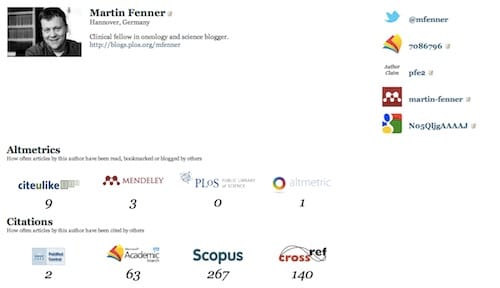I’m very proud to report that ScienceCard last week has been named finalist in the Mendeley/PLoS API Binary Battle. Not bad for a project that started only two months ago in a hackathon following the Science Online London conference and is done in my spare time. The winners of the contest will be named on November 30, but I’m more than happy that the project has even gotten this far.
The idea of ScienceCard is threefold:
- make it as easy as possible to create a profile page with your publications
- Automatically collect citations and other metrics for these publications
- make it as easy as possible to reuse this information, e.g. in your personal blog or reference manager
Registration with ScienceCard is easy. You create an account by logging in via Twitter (using the OAuth 2 protocol for the technically inclined), and then add your account name from one or more author identifier services. I added Google Scholar today, the other options are Microsoft Academic Search, AuthorClaim and Mendeley (I’m working on Scopus Author ID). If you add an Microsoft Academic Search or AuthorClaim identifier, ScienceCard will import all your publications from these services. ScienceCard currently only understands publications with a DOI, other scholarly items could be added in the future. With Mendeley and Google Scholar you only link to these services, I’m still having trouble with the Mendeley OAuth 1 authentication and Google Scholar doesn’t have an API.
ScienceCard is importing all the relevant bibliographic information using the CrossRef service. And ScienceCard is creating a shortDOI for all papers. But more interestingly, ScienceCard is calculating article-level metrics for all publications, and composite numbers for authors. For this ScienceCard is using the PLoS Article-Level Metrics API code, but I have added more sources, including Mendeley, Microsoft Academic Search and altmetric.com (but here only the number of blog posts citing a paper). ScienceCard links to most sources so that you can see the actual citations there, only CrossRef and altmetric.com don’t offer that. A future update will show all citations directly in ScienceCard.
ScienceCard tries to display a nice profile page for each researcher, but also makes it easy to reuse the information somewhere else. Each author page is available in six different formats, simply add the extension after the (Twitter) username, e.g. http://sciencecard.org/mfenner.json
- HTML – for regular viewing
- XML – for reuse by another computer
- JSON – for reuse by another computer
- CSV – comma-separated values for import into a spreadsheet
- RIS – for reuse by a reference manager
- BIB – BibTeX, for reuse by a reference manager

JSON is the most interesting format, because it makes it very easy to connect two different services. If you for example want to use ScienceCard data on your personal WordPress blog you can simply download my Contact Info Options WordPress plugin, add your ScienceCard username in your WordPress settings, and do some hacking of the author template. The process is unfortunately different for every WordPress theme, but you can see an example WordPress profile that uses the Annotum theme (and publishing platform) here:
This WordPress author profile is generated on the fly using ScienceCard data, and will therefore automatically update.
The ScienceCard project is still at the beginning, and there are enough ideas to move this project forward in interesting ways. I’m particularly interested in improving the user interface and display of information, adding datasets and other scholarly content, and in integrating with the ORCID unique author identifier service once the service launches in the spring of 2012. If you are interested in learning more about ScienceCard, please contact me via email or Twitter, or attend the altmetrics session at ScienceOnline2012, which I will do together with Euan Adie from altmetric.com and PLoS Impact Explorer, and Jason Priem from Total Impact (two other Mendeley/PLoS API Binary Battle finalists).


